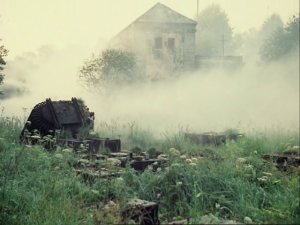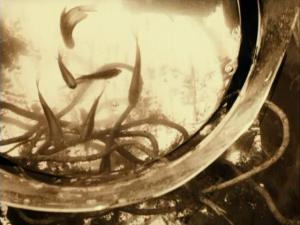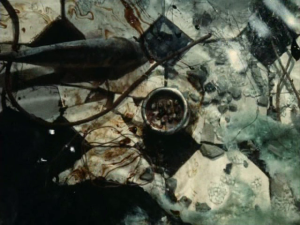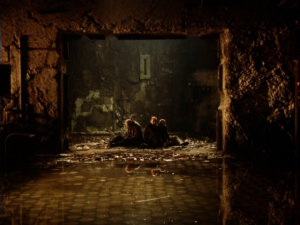Review by Bastian Gottbehuet
The hardest reviews to write are those about films you deeply love, so this will be a very hard review to write.
It is but a year since I came across this film, in which a guide takes two other men to a forbidden Zone that holds a room that is said to fulfill your “innermost wish,” but I have watched it four times since, purchased a book of poetry part of which had been used in Stalker, dug up the soundtrack by Edward Artemiev, read Tarkovskiy’s own book on his cinema, Sculpting in Time, and even bought a book by a guy who practically just re-told what we see onscreen with some comments, background info, and philosophizing added – and even that I enjoyed as it made me feel like I watched the film without actually doing it.
While most things in life cannot be reduced to simple sides in a binary system, it is interesting to see that like a heap of iron chips we either strive towards or away from many things we encounter. Stalker is such a thing, it is like a large magnet that looms somewhere in the dark. We may not understand it entirely, or be sure exactly why we feel about it like we do, but we either love it abnormally strong or despise it beyond sense.
When I had first watched it, I rated it an 8 to 9 on imdb.com. A day passed and I already felt how the grip the film had developed on my thoughts and dreams would not let go of me and made me come back to it since again and again. My rating has since changed to a solid 10…
Stalker is loosely based on the third chapter of Arkadiy and Boris Strugatskiy’s science fiction novel Roadside Picnic (1971); its script was also written by them, something that seems to provide cohesion and integrity for the movie. It is not entirely the child of Tarkovskiy, but the people involved where not some contracted craftsmen detached from the heart and meaning of the film, but had created its initial spark that made Tarkovskiy want to make the film in the first place.
The main reason why people either hate or love it is the fact that many people suffer from a major misconception about film in general: It is not, merely, there to provide quick, cheap, and meaningless entertainment. I shall not invoke the clichés about the opposition of those who watch Transformers 3 and rate it as “the best movie ever made” and those who deem themselves intellectuals for whom entertainment in general is to be despised. Stalker is not a film installation of random artsy frames or scenes one might encounter in a modern art museum (nothing against that, it’s just yet another kind of “film”), nor is it what most people would associate with “sci-fi.” There are no space scenes, nor space crafts as in Solyaris (1972), nor aliens, nor is it visibly set in some futuristic or technically advanced environment. In regard to these possible expectations, Stalker is one massive understatement. Since many people fail to be able to leave binary thought systems, however, for many Stalker is extremely boring, a let-down in sci-fi terms, pretentious, artsy, bland, and meaningless. For others, like me, it is little short of a revelation.
Once you allow yourself to calm down to the film’s own pace, instead of rushing through time without looking left or right, it draws you deeper and deeper into its own “Zone.” For me, while there have been many “serious” films before Stalker on my list, this one forever changed the way I watch films. That, to be honest with you, may even be something not entirely good. If you scroll down, you will find my review of “Skyfall” and see how much films like this are able to insult me now and any thinking audience. Stalker makes you think, it makes you listen, it makes you pay attention, and it plays with and employs an unfathomable array of subjects, themes, psychological mechanisms – it does what you will long for in any film after it: it takes you seriously. It doesn’t treat you like an idiot who needs to be spoon-fed every message, and who certainly won’t recognize if nothing you see makes any sense. Playing around with that, however, also means that you will find that the Zone behaves differently every time you see it, some scenes appear to tell you this on one occasion, and that on another. That, however, is not incoherency or meaninglessness, as many who hate the film for its lack of an apparent (!) happy end, claim, it simply pays respect to life’s quality of being complex and rich, instead of simple, straightforward, and clear.
Whenever you read a review about Stalker, you will find that, apart from several things most people can agree on – like its breathtaking cinematography (stop the film at random: what you see is ready to be printed, framed, and make your mind wander back to the “Zone” every time you look) – for each individual the film provided different things to love, to wonder about, to hold as its important core. Some even see it structurally, as a psychological piece that plays with your mind which cannot switch off its urge to see meaning within everything. Stalker is like a beautiful carpet you sit on, and an infinite number of objects and sparks of meaning you can play with forever.
It is poetic, it is funny at times, you may possibly just sit in awe at what you see, and its dialogue is so loaded with meaning and thought, you will find that watching it once will not reveal everything it has to say to you. Those who demand instant information, a “lecture,” have complained that they “don’t get it,” accusing those who love the film of pretending “to get it,” criticising them for behaving like a snobbish in-crowd. The simple fact with Stalker as with most other works by Tarkovsiy is, however, that there is no “it” – although if you maintain an open eye, ear, and mind, there is so much to be “gotten.”
When Stalker, Writer, and Scientist, the two men Stalker takes to the “Zone,” arrive in it, Stalker stretches like someone who awakes from sleep and says “Home at last.” For me, and for many others, the film itself has become the “Zone.”







loved reading this. i just finished the film for the first time and i am overwhelmed in the best way possible. this review/article helped put some things into perspective for me, so thank you.
Such a fantastic film. Once seen never forgotten.